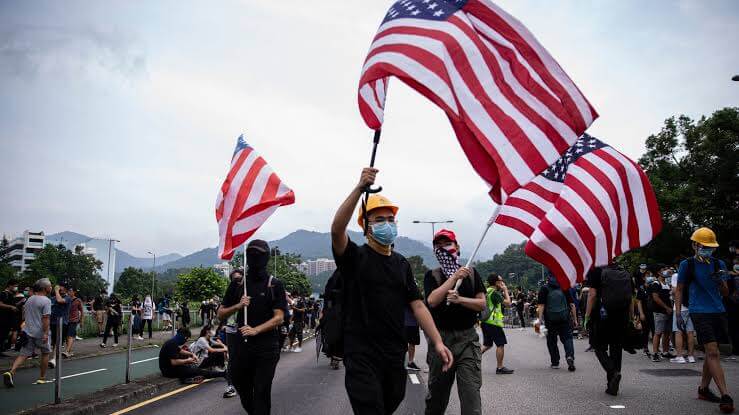On 27 November 2019, US President Donald Trump signed HR 3289, the Hong Kong Human Rights and Democracy Act (Hong Kong Act), into law, linking Hong Kong’s special trade status to its continued autonomy from mainland China.
The Bill was passed with overwhelming bipartisan support from the Senate and the House of Representatives, mainly owing to heightened sentiments surrounding the ongoing pro-democracy protests in Hong Kong, which started in June 2019.
Can a legislation in the US really influence Hong Kong’s struggle for democracy? And what are the possible repercussions of this Act on US’ strained relationship with China?
Hong Kong follows the “one country, two systems” principle with respect to the People’s Republic of China (PRC), and the region’s autonomy and the freedoms of its people are enumerated in the Joint Declaration by the governments of the United Kingdom (UK) and the PRC signed in 1984. The Basic Law of the Hong Kong Special Administrative Region of PRC came into effect from 1 July 1997.
Protests arose when the Hong Kong government tried to pass a bill that would allow fugitives from Hong Kong to be extradited to China. The Bill, now withdrawn, was perceived as a Chinese attempt to encroach on Hong Kongers’ freedoms and undermine its judicial system since it gave China a newfound ability to arrest political dissenters.
Hong Kong is a global financial and business centre and acts as a middleman between China and the world. The region is the only quasi-democratic territory under Chinese rule, following a free-market capitalist economic system and its own judicial system.
Under the 1992 United States-Hong Kong Policy Act, the US deemed the city a separate territory from the Chinese mainland “in economic and trade matters”. In the ongoing US-China trade war, this is especially useful since Hong Kong’s autonomy exempts it from protectionist tariffs from the US. Rather, thanks to the US' first sale rule, Hong Kong comes in as a relatively neutral space for the country to access certain Chinese goods without having to lift sanctions from the mainland. But even this relationship is at risk if the US begins to believe that the region is losing its autonomy.
The new Hong Kong Act specifies that Hong Kong will maintain its special trading status with the US only if annual State Department-led assessments find the level of autonomy given by Beijing to Hong Kong to be 'satisfactory'. This will be determined on the basis of annual reporting in Hong Kong on matters of American interests, which will include assessments of self-imposed or Beijing-mandated limits to the region's autonomy, and whether the revocation of Hong Kong's special status would pose a further threat to its autonomy.
The Act will also allow the imposition of sanctions on officials from Hong Kong and China who are found to be guilty of human rights abuse in the city. These sanctions include asset blocking and the denial of admission into the United States.
These measures are symbolic because Washington can neither afford to remove the city’s special status nor can it impose sanctions that can actually pressurize officials for a change in policy. The former is due to economic and political ties, and the latter because of the unilateral nature of the sanctions.
If Hong Kong’s special status is withdrawn, it would also drastically affect American businesses. According to the US State Department, around 1,300 American companies operate in Hong Kong. In 2018, the US’ largest trade surplus with any trading partner with Hong Kong, amounting to $31 billion.
On the question of intervention, the US cannot bring about a change in Chinese policy on the democratization of Hong Kong by itself. Sanctions without the support of other countries and allies or the UN lack efficacy. A companion Act also restricts US exports of crowd-control equipment like tear gas and rubber bullets to the Hong Kong police. But the provisions of the Act will not in any way limit the Hong Kong’s Chief Executive from repressing protestors.
The ongoing trade war between the US and China also makes it difficult for the former to employ substantive measures. Washington has little leverage against Beijing, and Trump signing the Hong Kong Act thus remains a symbolic move.
Pro-democracy protestors welcomed the passage of the Act with celebrations since it comes as a moral boost to those who have been fighting for months. It has also invited sharp comments from Beijing, which has asked Washington not to interfere in its ‘internal matters’. China has also suspended US military port calls in Hong Kong. Strategically, this will not affect the US since it can use several other naval bases in the region. However, the move symbolizes the growing tensions between the two powers.
Ultimately, The Hong Kong Act holds little influence in the realization of the protestors’ demands of autonomy and peace. Washington does not have the power or leverage to change the conditions in Hong Kong, and has thus responded to the calls for US support by the protestors with an Act carrying no strong provisions. As Trump and Xi Jinping engage in barbs and slap tariffs against each other’s goods, Hong Kong and its people continue their fight for democracy.
Reference List
BBC News. (2019, November 28). Hong Kong protests: China warns US over Human Rights and Democracy Act. BBC. Retrieved from https://www.bbc.com/news/world-asia-china-50584928
Lee, Y. N. (2019, November 28). US law backing Hong Kong protests could end up hurting everyone – the US, China and Hong Kong. CNBC. Retrieved from https://www.cnbc.com/2019/11/29/what-trump-bills-on-hong-kong-rights-protections-means-for-china-hk-and-us.html
Leung, H. (2019, November 22). Trump Just Signed Off on Legislation Aimed at Protecting Human Rights in Hong Kong. Here's What to Know. Time. Retrieved from https://time.com/5735361/hong-kong-rights-democracy-act-white-house/
Mg, T., & Chan, M. (2019, December 2). China hits back at democracy act by suspending US military port calls in Hong Kong. South China Morning Post. Retrieved from https://www.scmp.com/news/china/diplomacy/article/3040200/china-puts-hong-kong-port-calls-us-military-hold-after-donald
Image Source: Financial Times

